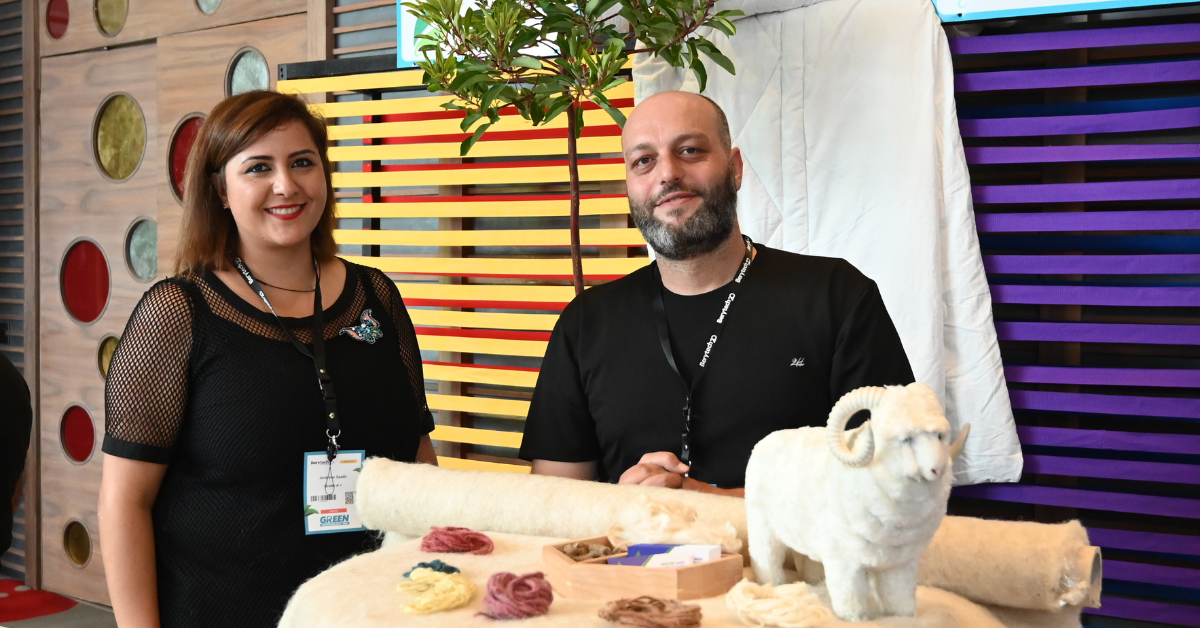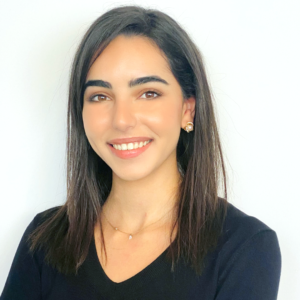GRADE A+ is a startup working to upcycle sheep wool blankets after discovering their unique features: breathable, soft, elastic, and hypoallergenic.
In June 2021, founder Jocelyne Saade and her team started collecting sheep wool and treating it in industrial machines. They used a quilting machine to produce blankets, of different dimensions and weights.
Unlike traditional blankets, upcycled wool blankets can be cleaned in a washing machine, are fire resistant, heatproof, and can control humidity. The team’s successful experiments have led them to produce the insulation rolls used in construction.
Q: Why did you decide to work on this solution, and how did you get started?
A: After seeing the yearly burning of 2,500 tons of sheep wool, our research showed us that sheep wool could be a raw material for tens of different products in different sectors: furniture, construction, clothing, and agriculture. During our first year of operation, we began collecting the wool that was thrown in the mountains and fields, for which we compensated the shepherds. Here the adventure of discovering this treasure began, and we started upcycling!
Q: How does your product work?
A: We wash the wool collected from shepherds using just water and without introducing any synthetic materials. After collecting the wool from the shepherds, we washed it with water and used no synthetic material. We experimented with choosing the appropriate cotton fabric for our work so that we move away from polyester materials, even if in small percentages. Thanks to Abou Walid, a shepherd who provides us with his sheep’s wool, we can produce 220 blankets or insulate 25 tents.
Q: What makes your solution special or unique?
A: We consider our role to be essential in returning wool to the market, but this time in an industrial way. Traditional blankets made from sheep wool disappeared from our market because they weren’t practical for our lifestyle. It requires cleaning, a practice that takes 2 days, and is very heavy, with a range of blankets in the six to ten kilos. Our blankets are two kilos lighter, suitable for modern tastes, and could be cleaned in a washing machine in 15 minutes.
Q: Who is benefitting from your solution?
A: Sheep wool works for thermal insulation and is a fire retardant that can be used in construction. We were able to turn the sheep wool into an easy-to-install roll that reduces the inside temperature of a tent by 8 °C in the spring. Laboratory results confirm these characteristics of our product that we share with wholesalers and trading companies.
Q: Why is your solution important to you?
A: My team and I are in the research and development phase of a third product, a nutrient-rich pelleted fertilizer used for plant growth in agriculture. It could save 25% of the water used in irrigation. Briefly, we will be able to save sheep wool from burning in nature and polluting the environment by upcycling it to produce blankets, insulation rolls, pellet fertilizers, and many other eco-friendly products.
Q: How is your solution relevant to your sector?
A: To compare our blankets to what is available in the Lebanese market, ours have higher quality and a more competitive price. We started doing laboratory tests for our sheep wool, and we discovered that it has a thermal conductivity of 0.035 W/m.K, the same as the fiberglass insulation that is imported and the most commonly used for insulation. Adding to that, it has many characteristics that give it an advantage over fiberglass and rock wool, including hypoallergenicity, humidity regulation, air purification, sound insulation, and fire protection.
Q: How is your solution relevant to Lebanon?
A: We notice that the Lebanese market is full of Dacron products, which they consider a refuge for rest and sleep, but are made up of chemicals that are highly toxic to our health. We were able to save 30 tons during these 2 years, and we are aiming to save 2,500 tons of sheep wool annually. After being sufficient for the local market, we will be able to export it, empowering the Lebanese economy as in New Zealand, Australia, the UK, Russia, and other countries.
Q: Why did you apply to the program? What were you hoping to achieve?
A: An idea can become a startup, but a lot of startups failed to become a business, because of their weakness in experience. We chose the short way, and instead of repeating the mistakes of others, we decided to learn business essentials by applying to the GIMED program and surrounding ourselves with experts.
The most valuable skill learned in this program is the one that you can’t hire anyone to do: eco-design. No one will know the workflow and how to improve employee behavior better than the entrepreneur. We learned how financial numbers could lead us to read the real present and predict the future of the company. In the group sessions, our shortcomings were highlighted, and in the one-on-one sessions, the experts filled in the blanks.
Q: What are your key success factors?
A: We were able to recognize that we reached the breakeven points because of the financial study conducted during the sessions, which gave us the motivation to keep going.
Q: What is one thing you would have done differently throughout your journey?
A: We believe that every step we took was the right one, even after we knew that we were wrong! It became an experience for us, and we learned the know-how from it.
Q: Have you ever thought of giving up on your venture? If yes, what made you pull through?
A: If a business is easy to do, everyone can do it! This is what can strengthen us to face challenges. The Grade A Plus team is doing a lot of things during the trial-and-error process, which took a lot of time.
Q: What advice would you give an entrepreneur who is starting out in your industry?
A: Our choice is to join our forces to continue by holding the fear of failure which will warn us of falling but not to retreat because we believe in our business.
About GIMED
Berytech is the official partner of The Green Impact MED Project – Positive Investments for Positive Impacts (GIMED), an EU-funded project under the ENI-CBC Med Programme aiming at supporting green entrepreneurs to better access finance and market in the Mediterranean. The project provides training, coaching sessions, capacity-building workshops, and sub-grants to consolidate green business creation and green business development. Learn more about the GIMED Project.










